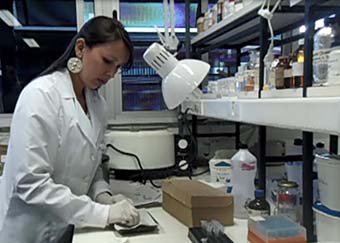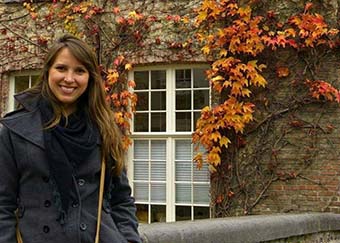Dr Paolin Rocio Cáceres Vélez: Humans of BioSciences
Meet Dr Paolin Rocio Cáceres Vélez, a J.N. Peters Fellow in the School of BioSciences. Pao investigates antioxidant therapy for visual disorders and aims to combine botanical compounds from native Australian plants and preclinical visual models to improve drug efficacy. Pao’s passion for biology has taken her around the world, from Colombia, to Brazil, Spain and Germany, and now to Australia.
Who are you and what do you do?
I come from Colombia, where the best coffee in the world is produced! I grew up on a coffee farm in Pitalito surrounded by my humble and loving family. As a member of a farmhand family, I have always appreciated the importance of natural resources for the economy and social development. I believe that it was during my childhood that I developed my passion for nature and a strong motivation to pursue the field of biology.
I have studied and conducted different research projects at institutions in Colombia, Brazil, Germany and Spain. I completed my bachelor’s degree with a major in biology at the University of Cauca in Colombia and obtained my PhD at the University of Brasilia in Brazil. My PhD was focused on the hazards of a wide range of compounds and nanomaterials that can pose risks to public health and the environment. The studies were carried out using different human cell lines and established in vivo models with aspects of the research conducted at the University of Leipzig in Germany and the Center for Cooperative Research in Biomaterials CIC biomaGUNE in Spain, where I was later appointed as a postdoctoral researcher.
I recently moved to Melbourne and joined Dr Patricia Jusuf’s lab in the University of Melbourne’s School of BioSciences. I will be leading a project titled “Using Australian native plants to treat visual disorders through gene expression modulation”.

How have you met the challenge of working from home?
In this unprecedented situation I am spending most of my time reading and writing papers, applying for funding as well as following online courses and webinars organised by the University. At this stage of my project, I am focused on obtaining the animal ethics approval required to perform in vivo experiments. For me, working from home is simply a matter of staying motivated! I really appreciate the support from the staff of the School of BioSciences during this process, and for providing me with the resources and tools I needed to work from home. I am especially grateful to my supervisor Dr Patricia Jusuf for her help and guidance during the lockdown.
What do you enjoy to do outside of science?
There are many things that I love to do outside science. For example, I love cycling, hiking, cooking and travelling! I am passionate about visiting new places, meeting local people and learning about their cultures. With my friends, we used to spend time together almost every week going cycling, hiking, and preparing foods from different countries. These are the things that I miss most during this pandemic situation.
Do you have any advice for undergraduate students?
I always let my students know how important human connections and friendships are for developing an outstanding career. Establishing networks with people from different fields and countries will allow you to learn and experience new things and to develop interdisciplinary skills. You will always do a better job when you are working towards your goals, rather than working to avoid something you do not want. The best way to get motivated to do something is to be passionate about your career. Forget about negative motivations, even if there are many obstacles that discourage you. Focus on setting and monitoring your progress toward the achievement of your personal and academic goals.
'Humans of BioSciences' is a special series to introduce the School of BioSciences' undergrad and postgrad students, our academics, professional staff and associates.
